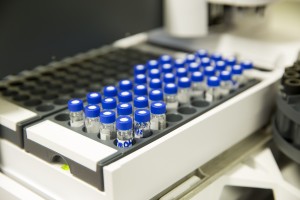Mayo Clinic Researchers Discover Genetic Markers for Alcoholism Recovery

Acamprosate is a commonly prescribed drug used to aid patients in recovery from alcoholism. Mayo researchers studied the association between variation in candidate genes and the length of sobriety in alcohol-dependent patients treated with acamprosate in community-based programs.
They found that, when other environmental and physiological factors were considered, patients with the common allele of the genetic variant rs2058878 located in the GRIN2B gene, stayed sober more days than those with a variant allele of the same polymorphism. This finding was replicated in a sample of alcohol-dependent patients treated with acamprosate in a study conducted by collaborators from Germany.
“This association finding is a first step towards development of a pharmacogenetic test allowing physicians to choose appropriate treatment for specific subgroups of alcohol-dependent patients,” says Victor Karpyak, M.D., Ph.D., Mayo Clinic psychiatrist and lead author of the article. “We believe that individualized treatment selection will eliminate the need for trial-and-error approaches and improve treatment efficacy in patients with alcohol use disorders.”
The Mayo findings support evidence implicating an important role of the N-Methyl-D-aspartate (NMDA) receptors in the treatment effects of acamprosate. The researchers say more studies are needed to determine potential importance of identified genetic variants in the longer-term effects of acamprosate, as well as the molecular and physiological mechanisms behind the drug’s action.
The study was funded in part by the Mayo Clinic Center for Individualized Medicine; the SC Johnson Genomics of Addiction Program at Mayo Clinic; the National Institutes of Health; the National Center for Advancing Translational Sciences; the National Genome Research Network of the German Federal Ministry of Education and Research; the Bundesministerium für Bildung und Forschung; and the Alfred Krupp von Bolen und Halbach-Stiftung (Foundation).
Other authors include J. M. Biernacka, Ph.D., Jennifer Geske, G.D. Jenkins, J.M. Cunningham, Ph.D., A.A. Leontovich, Ph.D., O.A. Abulseoud, M.D., Daniel Hall-Flavin, M.D., L.L. Loukianova, M.D., Ph.D., T.D. Schneekloth, M.D., M.K. Skime, Richard Weinshilboum, M.D., Mark Frye, M.D., and D.S. Choi, Ph.D., of Mayo Clinic; J. Ruegg, Karolinska Institutet; O. Kononenko, Uppsala University; J. Frank, M.D., M. Rietschel, M.D., F. Kiefer, M.D., and K. F. Mann, M.D., Mannheim-Heidelburg University; and M.M. Nöthen, M.D., University of Bonn.
About Mayo Clinic
Mayo Clinic is a nonprofit organization committed to medical research and education, and providing expert, whole-person care to everyone who needs healing. For more information, visit http://www.mayoclinic.org/about-mayo-clinic or http://newsnetwork.mayoclinic.org/ .
Media Contact
All latest news from the category: Life Sciences and Chemistry
Articles and reports from the Life Sciences and chemistry area deal with applied and basic research into modern biology, chemistry and human medicine.
Valuable information can be found on a range of life sciences fields including bacteriology, biochemistry, bionics, bioinformatics, biophysics, biotechnology, genetics, geobotany, human biology, marine biology, microbiology, molecular biology, cellular biology, zoology, bioinorganic chemistry, microchemistry and environmental chemistry.
Newest articles

Natural Product Hederagenin: A Breakthrough in Pain Regulation Research
A recent breakthrough in pain research brings hope to chronic pain patients. A team led by Prof. Dr. Annette Beck-Sickinger at the Institute of Biochemistry, Leipzig University, has uncovered the…

Coating for enhanced thermal imaging through hot windows
A team of Rice University scientists has solved a long-standing problem in thermal imaging, making it possible to capture clear images of objects through hot windows. Imaging applications in a…

Genes for the Adjustment of the “Internal Clock” are Closely Linked to the Aging Process
Age determines the genes that regulate our internal body clock. Intrigued by this biological function, the University Medical Center Halle published a study on the circadian rhythm linked to our…



